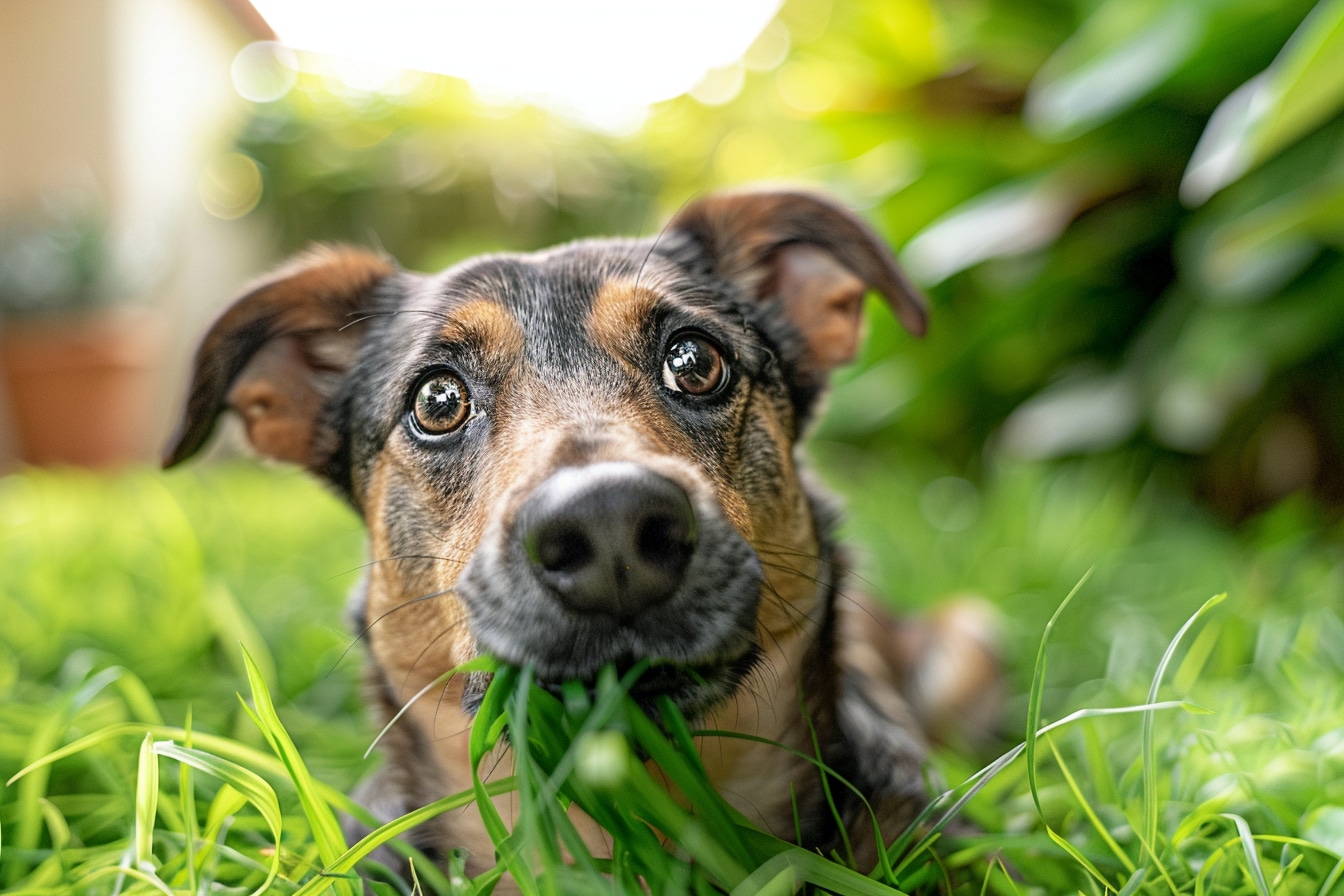Unraveling the Mystery of Canines’ Grass-Eating Habits: Reasons & Expert Veterinary Recommendations

Many dog owners find themselves perplexed by the behavior of their four-legged companion who, at times, seems to take great pleasure in grazing on grass like a peaceful ruminant would do. Before seeing any anomaly, let’s dive together into the mazes of canine psychology and physiology to shed light on the motivations for this behavior.
The reasons for dog grazing
An ancestral instinct
Herbivory in dogs may be linked to their wild ancestors, who occasionally consumed plants. This practice probably allowed them to provide food supplements to their mainly carnivorous diet. Dogs have retained this instinct which can lead them to eat grass even if they benefit from a complete and balanced diet.
The quest for nutrients
Some researchers argue that dogs turn to grass to compensate for a nutritional deficit. They might be looking to absorb fiber, minerals or enzymes which they find insufficiently present in their usual ration. A more in-depth examination of their diet would confirm or refute this hypothesis.
A self-medication mechanism
The herb, through its irritating action on the stomach, can cause vomiting. Some therefore think that the dog uses it as a means of purging itself. when he feels unwell. It is a sort of strategy of the animal to eliminate what could cause digestive problems.
Sensory pleasure
It cannot be ruled out that the taste of grass, its texture or the very act of grazing can be pleasant for the dog. This behavior could also be a form of play or sensory discovery, especially in puppies and young dogs who are actively exploring their environment.
Stress or boredom
A dog that eats grass compulsively could express a form of stress or boredom. Perhaps this activity gives him a calming effect or just something to do to fill his days.
Veterinary advice regarding this behavior
Feeding assessment
A nutritional assessment is necessary if we consider the hypothesis of a dietary imbalance. A veterinarian can determine whether to adjust the dog’s diet or offer supplements. The goal is to ensure that your diet provides all the nutrients necessary for your health.
Habit monitoring
Owners should observe how often and under what circumstances their dog eats grass. If this behavior is occasional and is not accompanied by worrying symptoms, there is probably no cause for alarm. However, monitoring remains important to spot any changes that may indicate an underlying health problem.
Prevent the risks of parasites and toxins
Eating grass can expose the dog to parasites or toxic substances like pesticides. It is therefore essential to ensure the quality of the grass to which he has access. Chemically treated spaces should be avoided, and regular deworming should be administered to prevent parasitic infestations.
Meeting behavioral needs
For a dog that eats grass out of boredom or anxiety, an appropriate response involves enriching its environment. Offer varied activities, stimulating games or physical exercise may prove beneficial. Likewise, relaxation or positive conditioning techniques can help reduce stress.
Consult if in doubt
It is recommended to consult a veterinarian if grazing behavior is accompanied by worrying symptoms such as frequent vomiting, loss of appetite, lethargy or any other signs of discomfort. A consultation will help rule out possible health problems and benefit from personalized advice adapted to the dog’s situation.
Respect their natural tendencies
Unless the dog’s health is at stake, it may be healthy to allow dogs to sometimes indulge in their instinctive behaviors, including eating grass. It is part of their way of being and can contribute to their overall well-being as long as it remains within safe and controlled limits.
Herbivory among our canine friends is a complex phenomenon. Far from being a simple taste whim, it echoes various physiological and psychological needs. Approached with curiosity and vigilance, a dog’s tendency to turn to grass can open up interesting perspectives on its well-being and strengthen the bond that unites us with our companions. It is in this attentive interaction that the role of responsible guardian takes on its full meaning, ensuring dogs a balanced and happy life.
Comments
Leave a comment